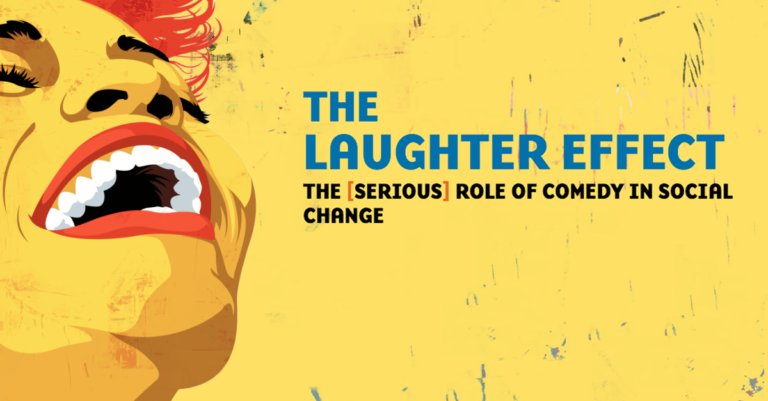Permission granted by The Washington Post to repost. Originally posted by The Washington Post on February 4, 2018. Image credit, CMSI.
American University wants us to laugh together
By Sarah Larimer
People can seem so tense these days, Megan Rummler said. They walk around in their own orbits, consumed by their own thoughts and opinions.
But comedy? It can offer a release, a way to talk about a difficult subject.
“Comedy is like — it’s like this big sigh, right? Comedy is a sigh,” said Rummler, an American University graduate student. “It’s like, let’s take a big step back. Let’s breathe. Let’s re-center ourselves and go from there.”
But comedy is also serious business, which explains why some at American are so interested in the intersection of comedy and social issues, in what makes us laugh but also the ways in which laughter changes our perspectives. Proving this is no laughing matter, American brought in a real pro with a fancy title:
Comedian in Residence.
“My goal is to speak to people’s hearts,” said Bethany Hall, who holds the title.
In her role, she hopes to “make people laugh with me who aren’t socially on the same page that I am.”
Hall knows the power of a good joke. She is a writer and performer, a regular on truTV’s “The Chris Gethard Show.” Her new gig as comedian in residence is a one-year fellowship that started in January and is underwritten by a foundation.
The arrival of the comedian in residence is the latest chapter in the Laughter Effect, which the school’s Center for Media & Social Impact inaugurated last year to enshrine its commitment to studying laughter, social issues and how good jokes can help us understand our world.
Part of the Laughter Effect focuses on research, working to understand how comedy can engage members of an audience and how it can spur the public to connect with social issues.
Caty Borum Chattoo, the center’s director, said it was designed to dig into “how comedy works when we think about social and civic issues, how we engage in issues differently when it comes through comedy.”
“But ultimately, we want to examine the possibility that comedy can be leveraged strategically when we think about engaging people on tough issues,” Borum Chattoo said.
That is where the idea for a creative talent — someone like Hall — came in. Borum Chattoo said she realized that researchers could crank out a ton of work, on every topic they could imagine. But having a comedian around was essential.
“Those of us who are not professionally funny people — we may be funny professionals, but not professional funnies — we can’t write comedy, we can’t make it great and hilarious and engaging, and something that will be shared by millions of people,” she said.
Which leads to the second aspect of the Laughter Effect, and Hall’s role: creating original comedy that addresses social issues. That material will not only draw from what researchers have already learned, but also will be released and studied.
Adding Hall to the initiative brings “legs to the research,” said Rummler, who is pursuing a master’s in journalism and digital storytelling at American and is a fellow with the Center for Media & Social Impact.
“Because she’s doing it,” she said. “She’s out there doing it; she’s been doing it. . . . It’s just going to give us so much more impact and substance to the research.”
This is an effort that comes at a unique cultural moment, Borum Chattoo said. Audiences can access comedians on YouTube or streaming services that air work dealing with difficult cultural issues that are part of the national conversation.
“And so if we have somebody like Bethany and her incredible network of comedians who become interested in talking about issues that matter through comedy . . . we might have a whole new area of work to study and learn from,” she said.
Borum Chattoo said that at times, it can seem as though a person’s identity is defined by their political choices.
“And I just don’t believe that’s true,” she said. “I think that most of us actually meet in areas of compassion and concern for our communities and our families.”
Those are the values that Borum Chattoo believes can be leveraged in comedy.
“It’s not that comedy is magic, but to the extent that comedy can be a cultural place where we can find some light and hope and optimism and we’re not purely defined by how we vote,” she said, “that’s the kind of work that we’re interested in studying and creating and hopefully starting new conversations.”
And Hall noted comedy’s “disarming” ability, saying that at times it can feel like there is a wall and people just don’t communicate with those on the other political side.
“A good laugh kind of knocks a few bricks off that wall,” she said. “And very few other things have the ability to do that.”
